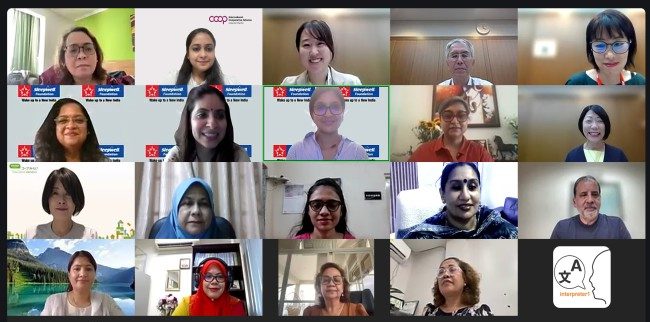In a recent online lecture organized by the ICA-AP Committee on Women, the focus was on emotional wellness, specifically targeting stress and anger management for women cooperators.
The event took place last month, in collaboration with Sleepwell Foundation India and saw participation from 27 individuals hailing from India, Japan, Malaysia, Nepal, and the Philippines.
The lecture was led by mental health counselors Neelam Agarwal and Parul Khanna Parashar, who discussed the ways stress affects the human body and provided coping mechanisms to address it.
According to the counselors, stress manifests through physical symptoms such as headaches, insomnia, depression, rapid breathing, weakened immunity, and fertility issues. In addition to these effects, high levels of stress can lead to unhealthy coping behaviors like procrastination, aggressive behavior, excessive use of social media, alcohol dependence, and reliance on medication.
The discussion also covered the subject of anger, dispelling common myths such as the belief that anger is inherently negative or that suppressing it is always beneficial. The counselors explained that anger is often misunderstood and can manifest in various forms, including aggressive, assertive, and passive-aggressive behavior.
They further demonstrated these types through a brief role-play to give participants a practical understanding of how anger can be expressed and managed.
In the latter part of the session, strategies for managing both stress and anger were introduced. These included meditation, yoga, music therapy, effective time management, journaling, spending time in nature, and consulting therapists when necessary.
The counselors emphasized that stress and anger affect women differently due to societal pressures, particularly for women in leadership roles where their ability to manage emotions is often compared unfavorably to men. Moreover, the expression of anger by women leaders is frequently discouraged, making emotional regulation an even more critical skill for women in such positions.
This marked the first time the Committee hosted a session on emotional wellness, and the response from participants was overwhelmingly positive. Many expressed a desire for more such sessions in the future.
In line with this, the Committee’s office bearers later met to discuss plans for 2025, deciding to organize a series of online sessions on emotional wellness and mental health, recognizing its importance for women cooperators across the Asia-Pacific region.





















































